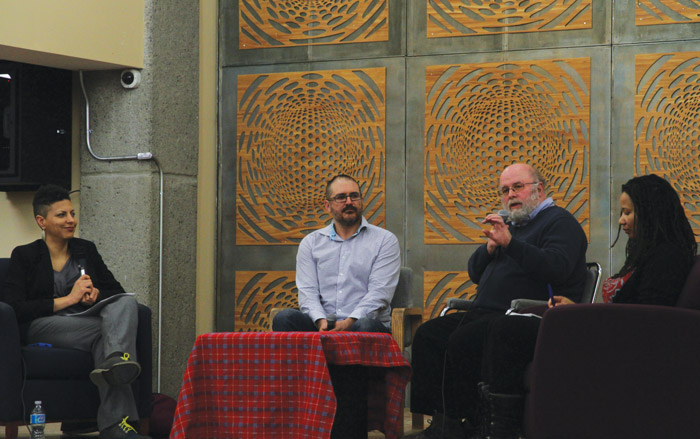A panel discussion on the history and development of anti-black racial practices in Canada and the United States was held on Feb. 16 as part of the David A. Freedman Speaker Series. Titled “Discourses of Race: The United States, Canada, and Transnational Anti-Blackness,” the event was organized by the McGill Black Students’ Network, the McGill Debating Union, the Women of Colour Collective at McGill Law School, Media @ McGill, and the McGill Department of History.
Panellists included Dr. Darryl Leroux, sociology professor at St. Mary’s University; Frank Mackey, an author on black history in Canada and Quebec; and Dr. Charmaine Nelson, art history professor at McGill University.
Rachel Zellers, a PhD candidate at McGill who on critical race theory, moderated the discussion. She opened the conversation by reflecting on the interchanges of racial segregation practices between the U.S. and Canada.
Zellers remarked that although Jim Crow practices are typically understood as uniquely American, they were also present in Canada.
“Jim Crow did not respect nation-state boundaries,” Zellers said. “Canadians turned to American Southerners for clear clues on how to handle blacks migrating into Canada, adapting Jim Crow to fit into Canada’s political archetype.”
She argued that the transnationalism of Jim Crow laws can be understood through historic moments in the U.S. and their influence in Canada. She highlighted the Fugitive Slave Acts, which were a pair of federal laws that allowed for the capture and return of runaway slaves.
“In 1850, for example, the implementation of the Fugitive Slave Acts in the U.S. took place,” she said. “At the same time in Canada, 1850 saw the enactments of legalized racial segregation in Upper Canada’s schooling system.”
Zellers explained that between 1896 and 1911, the Canadian Department of Immigration created its own Jim Crow policies to deter black migration to the West. By 1911, the Laurier government instituted the first federal law in Canada based on racial exclusion that banned black immigration into Canada.
“The Canadian Department of Immigration halted the migration of black farming families from the U.S. by sending its agents into Oklahoma and Kansas to pay bribes directly to prominent black American community leaders,” she said. “Black physicians were paid to tour and testify that a biological lack of fitness prevented black bodies to survive the frigid conditions in [the] Canadian West.”
Nelson, who explores race through art history in her teaching, then reflected on her own experiences at McGill, stating that students are often surprised by her desire to talk about race in a Canadian context.
“I have yet to encounter the Canadian student who enters knowing that slavery happened in Canada,” she said. “This is not a conversation that should be happening for the first time in a university setting.”
In the latter part of the panel discussion, Zellers focused the discussion on slavery in Quebec. The panellists agreed that Quebec’s relationship to racism and slavery was and remains particularly unique.
“In Quebec, French people emphasize their marginalization rather than their privilege,” Nelson said. “They only ever speak of themselves as victims within the context of Canadian society, rather than oppressors [….] However, we need to talk about the need to maintain anti-ethnic practices.”
Zellers said that Quebec’s history has long been misrepresented, explaining that slave practices in Quebec were influenced by the U.S. and England.
“In New France, 17th century [French] colonists justified their indigenous slavery by closely observing French Atlantic slave practices [of black slaves],” she said. “They aimed to make their indigenous slaves ‘like negroes.’”
Near the end of the conference, the conversation became heated when Mackey suggested that slavery in Quebec took on a different form than it had in the U.S. Leroux quickly refuted Mackey’s claim.
“The only reason plantations were not present in Quebec is because it was unprofitable due to the Canadian climate,” Leroux said.
Zellers wrapped up the discussion by responding to Mackey’s remarks.
“Those discrepancies or differences between how brutal or how less brutal slavery was in the context of Canada are not important to me at the end of the day,” Zellers said. “At the end of the day, when the talking point is really about one humanity, that’s all that matters. The differences in brutality serve a purpose in my mind that serves white people much more than black people.”








